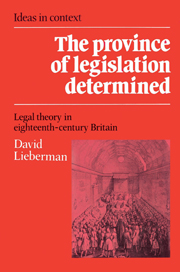Book contents
- Frontmatter
- Contents
- Preface
- Abbreviations
- Introduction
- I Blackstone and the Commentaries
- II The judiciary
- 3 Equity, principle and precedent
- 4 Legal principles and law reform
- 5 Mansfield and the commercial code
- 6 Common Law, principle and precedent
- 7 Kames, legal history and law reform
- 8 Kames and the principles of equity
- III Parliamentary statute
- IV Bentham
- Conclusion: The province of legislation determined
- Bibliography
- Index
8 - Kames and the principles of equity
Published online by Cambridge University Press: 10 October 2009
- Frontmatter
- Contents
- Preface
- Abbreviations
- Introduction
- I Blackstone and the Commentaries
- II The judiciary
- 3 Equity, principle and precedent
- 4 Legal principles and law reform
- 5 Mansfield and the commercial code
- 6 Common Law, principle and precedent
- 7 Kames, legal history and law reform
- 8 Kames and the principles of equity
- III Parliamentary statute
- IV Bentham
- Conclusion: The province of legislation determined
- Bibliography
- Index
Summary
For Kames the lessons of legal history and the claims of social welfare both pointed to the need for legal change. The most startling feature of his program for law reform was that it was to be put into effect by the judiciary. Kames based his endorsement of this judicial route to legal improvement on a novel theory of legal equity and a trenchant analysis of the legal implications of recent social development. But the notion of the judicial office this program entailed also reflected less theoretical matters, and these relate largely to Scotland's political circumstances in the period following the 1707 Act of Union.
Many of these more practical considerations can be viewed as a Scottish version of the problems regarding parliamentary legislation which Blackstone diagnosed in the Commentaries. Blackstone, as we have seen, recognized parliament's constitutional authority as an “absolute despotic power” for making and changing law. At the same time, though, he remained deeply pessimistic over the quality of parliament's enactments, and explicitly resisted the notion that the legislature might be called upon to exercise its constitutional authority by implementing major changes in English law. Blackstone did not, in any case, believe common law required major improvements, and on this important matter his position contrasts with that of Kames. Nevertheless, the difficulties he discerned in the practicalities of parliamentary law-making were even more dramatic when applied to Scotland.
Following the Union, Scotland lacked a native legislature and had to depend upon Westminster for new statute law.
- Type
- Chapter
- Information
- The Province of Legislation DeterminedLegal Theory in Eighteenth-Century Britain, pp. 159 - 176Publisher: Cambridge University PressPrint publication year: 1989

